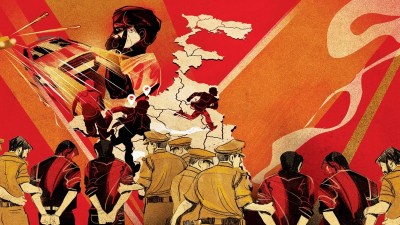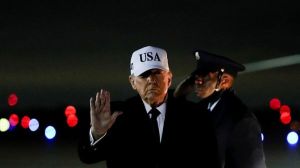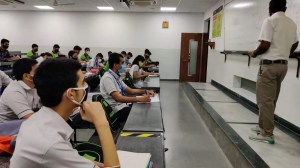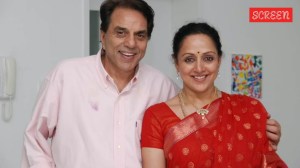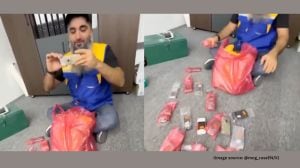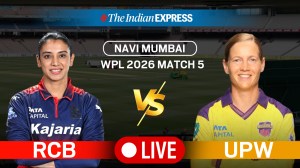Final Encounter?
As the encounters increased, so did the popularity of the 8216;encounter specialist8217;. Daya Nayak, Pradeep Sharma, Ravindra Angre, Praf...

The fall from grace is nearing the end for Nayak, the face of Mumbai8217;s cult group of encounter specialists. Accused of amassing assets worth more than 212 per cent of his known sources of income and suspended from the force, Nayak finds himself thrown together8212;once again8212;with former boss, inspector Pradeep Sharma, accused of staging the 8216;escape8217; of Ghatkopar blast accused Khwaja Yunus after he was allegedly killed in police custody.
These two developments over the past week could signal the first cracks in the dark side of the police force. Already, questions are being asked as to how encounter specialists were allowed to grow larger than the force. Were they encouraged by senior police officials and politicians? Retired and serving police officials substantiate these concerns.
Men of the Moment
CREATED by the police around 1997 to deal with the growing extortion demands and threat calls to builders, realtors, businessmen, Bollywood denizens8212;and also the bloodbath spilling over onto Mumbai streets as a result of inter-gang wars8212;the encounter policy was heavily dependent on men such as Nayak and Sharma.
But they were just two members of the five four/five-man squads created with the blessings of then deputy commissioners of police Satyapal Singh and Parambir Singh, who had the task of gathering information about the underworld and cutting it to size.
The squads soon came to be associated with 8216;encounters8217;, an euphemism for a situation in which a gangster is cornered, asked to surrender, ostensibly attacks the police or tries to escape, and is shot dead in retaliatory action.
History Sheet
BUT encounters were not a new phenomenon to the Mumbai police. 8216;8216;It would be naive to believe the police would have been able to tackle organised crime in a city like Mumbai without encounters,8217;8217; says former Maharashtra DGP Arvind Inamdar, who resigned from the force in 2000. 8216;8216;But there were no such squads back then. And the junior police officers who carried out the encounters were always kept in check and rotated out after a certain number of encounters.8217;8217;
According to Inamdar, the Maya Dolas incident8212;a Dawood henchman, he was shot dead in 1992 by a policeman named Aftab Ahmad Khan, allegedly at the underworld8217;s behest, in an encounter televised live on CNN8212;was one of the first indicators of how the strategy could backfire. The Anti-Terrorist Squad, which conducted the encounter, was accused of walking away with Rs 70 lakh belonging to Dolas. Petitions alleging corruption were also filed against those involved in the encounter.
But to all intents and purposes, encounter specialists got a free hand from then on. 8216;8216;Gopinath Munde, then home minister, openly declared he had ordered the police to shoot down gangsters,8217;8217; says Julio Ribeiro, former Mumbai police chief. 8216;8216;But it all started going wrong post-1997. And the situation went out of control from 2000,8217;8217; adds Inamdar.
Order of Corruption
THIS was also the period, say former top brass of the police, when the senior officers who could have checked the juniors were themselves unscrupulous. The order of command was subverted, with the ACP-level made redundant and the junior officers reporting directly to the top rung who, in turn, got their orders from corrupt politicians.
8216;8216;The situation was so bad that police postings and transfers were paid for. Police stations were literally auctioned by home ministers. I have openly mentioned Chhagan Bhujbal in various articles in this connection. With the seniors so corrupt, there was no way they could have checked the junior encounter specialists,8217;8217; says Ribeiro.
8216;8216;Perhaps some of the junior members of the team tasted power too early in their careers and could not handle it,8217;8217; a senior officer tries to analyse the rise and fall of the 8216;specialists8217;.
Fatal Finish
THE special squads no longer exist, but the soft spot for 8216;encounter finishes8217; persists. 8216;8216;Even now I have to repeatedly remind the officers that we have stringent laws like MCOCA and MPDA to rein in organised crime. I cannot, of course, say anything if the officer says he fired in retaliation and killed the gangster and the evidence backs him,8217;8217; says Joint Commissioner of Police Crime Meeran Borvankar.
Part of the reason why encounters survive, say senior police officers, is the time consumed by court trials.
JCP Borvankar is categorical that she does not encourage 8216;8216;quick justice8217;8217; through encounters. 8216;8216;Now we are using detection skills to pick up the foot-soldiers and book them under MCOCA to cut off their economic links with their bosses abroad,8217;8217; she says.
But the system comes too late for the likes of Daya Nayak.
But for one of Daya Nayak8217;s own who turned against him, the rogue cop may have got away with his scams
THE end of the beginning for Daya Nayak came when former journalist-cum-fixer Ketan Tirodkar8212;once Nayak8217;s close aide and a self-confessed partner in his extortion business8212;filed a private complaint at the Maharashtra Control of Organised Crime Act MCOCA court against Nayak on November 13, 2003.
He alleged that Nayak had close links with underworld dons Chhota Shakeel and Faheem Machmach and had amassed wealth beyond his means through his liaisons with organised crime syndicates.
Tirodkar also alleged that Nayak had been extorting money from businessmen, staging encounters, bribing senior police officials, and planting fabricated news in the media, all at the behest of Chhota Shakeel.
Mumbai police chief A N Roy, who was asked to evaluate if Nayak could be prosecuted under MCOCA, assigned the probe to Economic Offences Wing ACP Dilip Sawant. Going by Sawant8217;s report, submitted to the Anti-Corruption Bureau ACB in October 2005, there was no proof of Nayak8217;s alleged links with the underworld, but there was indication of a fortune well beyond his known sources of income.
After raiding Nayak8217;s known haunts and his home in the Kandivli police quarters, the ACB registered a case of corruption under section 13 disproportionate assets of the Prevention of Corruption Act against Nayak on January 20, 2006.
ACCORDING to the ACB, Nayak used his wife Komal and associate P Manivellan as fronts to float bogus companies in order to convert his dirty money into white.
ACB officials say Nayak would buy sick companies through Manivellan and either he Manivellan or Komal would be shown on paper to be directors of these companies. Manivellan8212;arrested by the ACB on January 22 for abetment8212;was the director of six companies: Deve Paints and Raja Cyber Private Limited with headquarters at Fountain and Kuber Housing Finance Company, Surya Prabha Makers Private Limited, Dharni Dharan Construction and Kuber Finance. All of them operated from one hole in the wall in Santa Cruz west.
Komal, on the other hand, was found to be the director of Ojus Housing Finance Company Limited, where she had worked earlier.
The ACB also found that Nayak had bought a swanky flat in Amboli Naka through Rajendra Padate, a close friend, owned a second apartment in the very-upmarket Avalon building, Hiranandani Gardens, and yet another at Shri Vinayak Cooperative Society in Charkop.
Besides a Mercedes car bought in Padate8217;s name, the ACB found Nayak to own two hotels in Goa and an interstate tours and travels company with 25 luxury buses to its name. Both Komal and Padate were charged by the ACB for aiding and abetting Nayak.
IT8217;S certainly a long way from Mangalore, where Nayak was born in 1970 and which he left to clean restaurant tables in Mumbai at the age of nine. The restaurant-owner quickly became his mentor; Nayak went on to graduate from college while living and working at the restaurant.
After working as a plumber for a short while, Nayak joined the police force in 1995. A year8217;s training at the Nashik police training school later, he was posted as a sub-inspector at the Juhu police station. In 1997, he joined the special squad for the northern region and, in 1999, was transferred to the Andheri unit of the Crime Branch. The next move, to the Charkop police station followed in 2001; he remained there till being suspended from service earlier this month.
In between 83 encounter killings, inspiring such films as Kagaar and Ab Tak Chhappan and offering inputs to filmmakers for their movies on the underworld, alleges Tirodkar8217;s complaint, Nayak was chest-deep in illegal money dealings. Among the instances he cites:
8226; December 2002: Zamir Kazi and his associate Shakeel Solkar are arrested by Nayak for allegedly possessing an Israel-made Uzi sub-machine gun. Calls are then made to Dawood man Tariq Parveen demanding Rs 50 lakh for letting them off the MCOCA hook. Nayak settles for Rs 20 lakh, which is paid through Tirodkar. According to official records, Kazi and Solkar were booked under the Arms Act and released soon after.
8226; February 2003: Adil Farooq among his credits: Tum, starring Jackie Shroff and Saif Ali Khan is detained for alleged links with Abu Salem and use of underworld money to finance films. Tirodkar helps contact Adil8217;s Dubai-based brother Kamal; Rs 50 lakh is paid to Nayak for Adil8217;s release.
8226; April 2003: Tirodkar collects Rs 5 crore sent by Chhota Shakeel for Nayak to affect transfer of Inspector and his mentor Pradeep Sharma of Crime Branch, Andheri unit, and a few other officers as they are blocking Nayak8217;s ambitions of controlling the unit. Soon, Sharma is moved to the Crime Branch headquaters at Crawford market.
8226; April 2003: Tirodkar is asked by Nayak to contact Chhota Shakeel aide Fahim Machmach to threaten Dahisar-based chemical trader Pankaj Hathi in the name of five other traders with whom Hathi has a dispute and against whom he has lodged a complaint with the Crime Branch. Hathi approaches the Crime Branch on receiving the threat calls and files a case against the five traders. Nayak then called up traders Hasmukh Shah, Jayant Shah, V G Ajmera and two others and asks them to pay Rs 25 lakh to wind up the case. This money is sent to Chhota Shakeel by Nayak.
8226; May 2003: Tirodkar receives Rs 2.25 crore from businessman R C Agarwal on Nayak8217;s behalf to eliminate one Tejpal Singh, who allegedly occupies 12,000 sq ft in a building owned by Agarwal in Santa Cruz East. One Sushil Parekg, who has encroached on an Agarwal-owned plot of land adjacent to the building, is to be kidnapped and coerced into vacating the plot.
8226; According to Tirodkar, on January 11, 2003, Nayak and he conspired and asked 18-year-old Sadiq Jamal Mehtar, domestic help of D gang member Tariq Parveen who was then visiting the city, to accompany three Gujarat policemen posing as journalists to an area outside Borivali National Park as Nayak wanted to oblige a top Gujarat politician. Mehtar was later killed in an encounter by the Ahmedabad Crime Branch, which claimed that he was planning to eliminate Gujarat Chief Minister Narendra Modi.
With Swatee Kher 038; Sagnik Chowdhury
- 01
- 02
- 03
- 04
- 05


